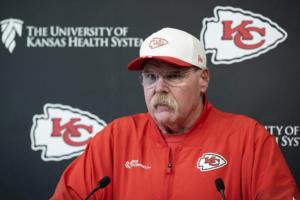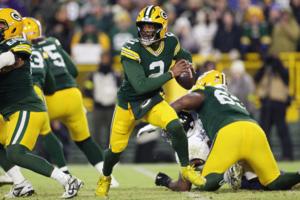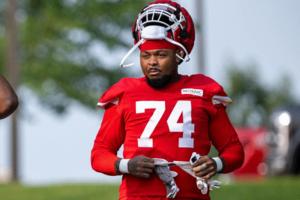Sports
/ArcaMax

Omar Kelly: Drafting a QB every year isn't the answer, having legitimate competition is
MIAMI — This is what being down bad looks like in the early stages of an NFL franchise’s rebuild.
It’s adding an aged veteran (Trent Green, Chad Pennington or Ryan Fitzpatrick) who has had success in spurts, and having him compete with a young quarterback (John Beck, Chad Henne or Josh Rosen) who is supposed to have upside.
The Miami ...Read more

Seahawks' Rashid Shaheed testing NFL free-agent market, report says
SEATTLE — When he was introduced as a Seattle Seahawk the day after his acquisition from New Orleans last November, Rashid Shaheed said he’d hoped he had found his long-term home.
“I’m here to stay,” said Shaheed, who was available, in part, because he was in the final season of his contract and it had become clear he was likely not ...Read more

Aaron Rodgers noncommittal about playing with Steelers in 2026
PITTSBURGH — Aaron Rodgers made his first public comments of the offseason on Wednesday in an appearance on “The Pat McAfee Show,” and anyone hoping for news on his playing status for the 2026 season walked away disappointed.
Rodgers talked glowingly of his year in Pittsburgh with the Steelers and of his relationship with new coach Mike ...Read more

Rams finalizing deal to acquire All-Pro cornerback Trent McDuffie from Chiefs
LOS ANGELES — Les Snead, no stranger to blockbuster trades involving first-round picks, might be on the verge of doing it again.
On Wednesday, the Rams general manager appeared to be getting closer to addressing his team's most pressing need by nearing a possible agreement with the Kansas City Chiefs to trade for cornerback Trent McDuffie, a ...Read more

Bears Pro Bowl center Drew Dalman retires at 27, much the way his father did 26 years ago
As the Chicago Bears were rocketing toward an NFC North title and playoff run, quarterback Caleb Williams made a comment on social media about his Pro Bowl center Drew Dalman that has proven prophetic.
"He's the brains behind all of it."
Dalman informed the Bears on Tuesday that he will retire. Now. At age 27. After only five NFL seasons. ...Read more

Source: Patriots releasing Stefon Diggs after start of league year
BOSTON — The Patriots plan to release wide receiver Stefon Diggs after the start of the league year, a source confirmed to the Boston Herald.
The move frees up $16.8 million in cap space, per OverTheCap.com. On March 13, two days after the new league year begins, $6 million of Diggs’ $20.6 million salary was set to be guaranteed.
Diggs ...Read more

Vahe Gregorian: 'Looking forward to the challenge': How Andy Reid's catchphrase applies anew now
KANSAS CITY, Mo. — Days before his most recent media interview, Andy Reid’s Chiefs were conspicuously absent from the Super Bowl for the first time in four years — and from the playoffs for the first time in more than a decade.
More distressingly, their 11 losses last season didn’t just mark the head coach’s first losing season since ...Read more

Illinois Gov. JB Pritzker, Chicago Mayor Brandon Johnson keep up Bears stadium pitches
CHICAGO — Chicago Mayor Brandon Johnson and Illinois Gov. JB Pritzker on Tuesday continued mounting their public pitches for where the Chicago Bears should build their next stadium in Illinois, even as the NFL franchise keeps up its flirtation with a move to Indiana.
During the groundbreaking ceremony for the Chicago Fire’s new — ...Read more

Rams in talks with Matthew Stafford about reworking his contract
With Matthew Stafford back in the fold for the 2026 season, the quarterback and his representatives have begun discussions with the Los Angeles Rams about a potential reworking of his contract, head coach Sean McVay said Tuesday.
“We’ve had great dialogue,” McVay said. “I feel confident about being able to work those things out. … We�...Read more

Seahawks don't place tag on RB Kenneth Walker III
SEATTLE — As expected, the Seahawks did not place a franchise or transition tag on running back Kenneth Walker III by Tuesday’s 1 p.m. deadline.
The deadline came and went a few hours after there were multiple reports from national NFL writers reiterating that it was expected Walker would not get tagged.
Not being tagged means Walker, who ...Read more

Jets place franchise tag on RB Breece Hall
NEW YORK — Ahead of the deadline, the Jets will have their star rusher for at least another season.
The Jets will place the non-exclusive franchise tag ($14.29 million) on running back Breece Hall, sources confirm to the New York Daily News.
They had until 4 p.m on Tuesday to place either the franchise or transition tag on Hall ahead of the ...Read more

Drew Dalman, the Pro Bowl Bears center, reportedly is retiring at age 27
CHICAGO — Chicago Bears center Drew Dalman has informed the team he is retiring at age 27, according to multiple national reports.
Dalman has played five seasons in the NFL, including one with the Bears. He signed a three-year, $42 million free-agent contract with the team last March.
He started at center in all 17 regular-season games and ...Read more

Omar Kelly: Is Malik Willis worth his proposed price tag?
MIAMI — Know that moment when you have found an item you would like to possibly purchase, then your eyes nearly pop out your head looking at the price tag?
You have been hit with sticker shock, and immediately rush to put the overpriced item down.
That seemed to be Jon-Eric Sullivan and Jeff Hafley’s reaction to the asking price on ...Read more

Gerry Dulac: Don't expect Steelers to draft QB early, with or without Aaron Rodgers
PITTSBURGH — The Pittsburgh Steelers could find out this week if Aaron Rodgers intends to return for the 2026 season to be their starting quarterback, even though his decision will not affect what they might do in the April draft.
Before he left after the playoff loss to the Houston Texans, Rodgers told the Steelers he hoped to make a ...Read more

NFL Combine Takeaways: QB Ty Simpson among the biggest winners
Few players had more to gain at the NFL Scouting Combine than Ty Simpson.
The polarizing Alabama quarterback entered the so-called “Underwear Olympics” in Indianapolis as the No. 2 quarterback on most analysts’ boards, yet his draft stock was a question due to his relative inexperience and uneven play down the stretch last season.
With ...Read more

Lions trade David Montgomery to Texans
DETROIT — The David Montgomery saga has finally come to an end.
After a few days of public back-and-forth, the Detroit Lions are sending Montgomery to the Houston Texans, according to multiple reports. NFL Network and The Athletic reported the compensation going back to Detroit is center Juice Scruggs, a fourth-round pick and a seventh-round ...Read more

Chiefs plan to release right tackle Jawaan Taylor, per reports
KANSAS CITY, Mo. — The Kansas City Chiefs have informed right tackle Jawaan Taylor that he will be released before the start of the new league year on March 11, according to multiple reports.
The expected roster move saves the Chiefs $20 million against the cap while leaving $7 million in dead money.
After his rookie contract with the ...Read more

Troy Renck: By George, it's time Broncos give GM Paton a contract extension he's earned
INDIANAPOLIS — Time to acknowledge the role the man in the shadows played in returning the Denver Broncos to the spotlight.
They won 15 games. They reached the AFC Championship in their second-straight playoff appearance. And their roster cements them as an annual contender, faster than anyone thought possible.
Which makes it obvious which ...Read more

Omar Kelly: Dolphins have extensive to-do list this offseason
MIAMI — The shelves are bare, and the pennies are being pinched.
The Miami Dolphins have spent the majority of Steve Ross’ tenure as the franchise’s owner as one of the NFL’s biggest spenders, but South Florida’s football franchise is paying the price for years of living outside its means.
Trades for big-money players, and lucrative ...Read more

Some Indiana taxpayers not as thrilled by Bears stadium plan as lawmakers
CHICAGO — In the rush by the Indiana legislature to bring the Chicago Bears to the state, lawmakers gushed over the proposal.
One sponsor said they’d be “honored” to welcome the Bears owners. Another called the legislation “a major historical event.”
One group was conspicuously absent from comments at the capital in Indianapolis: ...Read more
Popular Stories
- Aaron Rodgers noncommittal about playing with Steelers in 2026
- Source: Patriots releasing Stefon Diggs after start of league year
- Bears Pro Bowl center Drew Dalman retires at 27, much the way his father did 26 years ago
- Rams finalizing deal to acquire All-Pro cornerback Trent McDuffie from Chiefs
- Seahawks' Rashid Shaheed testing NFL free-agent market, report says





